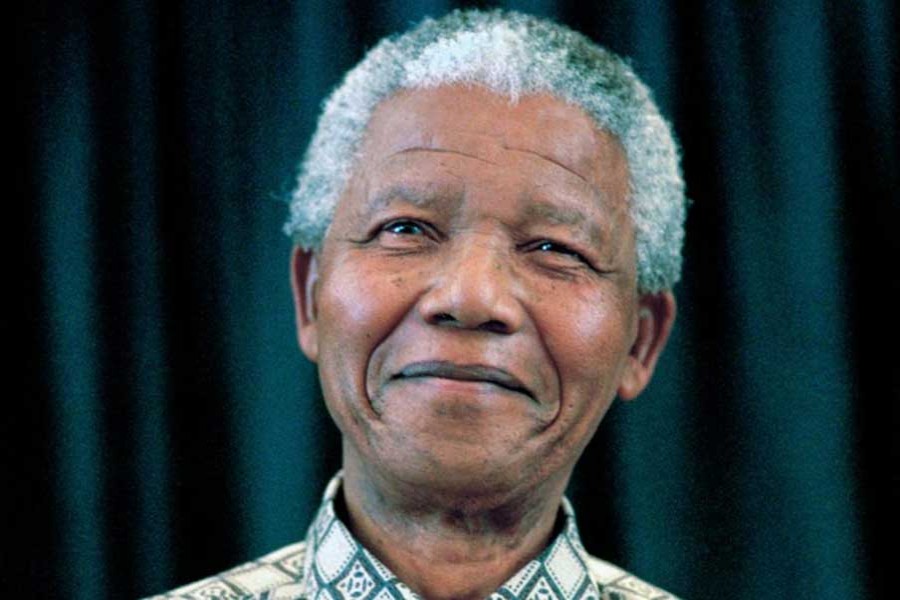
Published :
Updated :

Nelson Mandela International Day (or "Mandela Day") is celebrated on July 18 every year. On this day Mandela was born in South Africa in 1918. He would have turned exactly 100 years this year.
The United Nations declared "Mandela Day" on 10 November 10, 2009. The declaration was unanimous mainly for two good reasons: First, to pay tributes to a charismatic leader - "a giant of history", and second, to advance Mandela's ambitious campaign - fashioning the "world a better place" for everybody.
The world honours the Nobel laureate for Peace this day. Mandela served as the President of South Africa during 1994-1999 and led the transition of the country to democracy, freedom and justice. He established the Nelson Mandela Institute for Rural Development and Education in 2007.
Mandela Day is a global call highlighting Mandela's core ideals and beliefs. It is an important occasion for every individual for carrying out humane activities and inspiring change towards a better life and better world. Mandela, a "profoundly good human being" as described by former US President Barack Obama, fought for democracy, human dignity, equality and rule of law. The UN General Assembly resolution A/RES/64/13 had acknowledged Nelson Mandela's values and his services to humanity. These are: reconciliation, protection of human rights, equality, and drive against poverty, and promotion of social justice.
Mandela believed that every person has the responsibility and power to transform the world for the better. Thus, they have a responsibility and capacity to contribute to the benefit of the society and the future generation. Precisely, the campaign message of the Mandela Day is: "Nelson Mandela has fought for social justice for 67 years. We're asking you to start with 67 minutes."
Courageous, compassionate, ethicist and outspoken Mandela devoted his life for his beloved motherland. Mandela said, "The brave man is not he who does not feel afraid, but he who conquers that fear."
While paying tributes to Mandela, Archbishop Emeritus Desmond Tutu said, "Never before in history was one human being so universally acknowledged in his life as the embodiment of magnanimity and reconciliation as Nelson Mandela was."
Mandela's three-hour long powerful speech, delivered before his incarceration for his effort to overthrow the apartheid regime of South Africa, remains one of the extraordinary speeches in world history. At the famous Rivonia Trial in 1964, Mandela said, "I have fought against white domination, I have fought against black domination. I have cherished the ideal of a democratic and free society in which all persons will live together in harmony and with equal opportunities. It is an ideal which I hope to live for and to see realised. But, if needs be, it is an ideal for which I am prepared to die."
Mandela spent 27 years in prison for fighting against the apartheid regime of South Africa. Yet, when he was freed in 1990 amidst national and international pressure, and eventually became the president of the country, he disregarded the call for revenge and opted for reconciliation with his oppressors. He established the unique "Truth and Reconciliation Commission" under the leadership of Archbishop Desmond Tutu, the first in the world. Mandela belongs to all ages. He repeatedly called on the next generation to make concerted efforts to eliminate injustices from the world.
In December 2015, the UN decided to further expand the scope of Nelson Mandela International Day. Thus, the UN General Assembly resolution A/RES/70/175 not only adopted the UN Standard Minimum Rules for the Treatment of Prisoners, but also approved a set of new guidelines to be known as "Nelson Mandela Rules."
However, Mandela's vision for a democratic, tolerant and corruption-free developed society with equal rights, and social justice, still remains unrealised. What is more distressing, in recent years, Mandela's South Africa has been in the grip of corruption, increasing mayhem and murders.
South Africa and many countries around the world are challenged with unabated corruption, killings and violent crimes, discrimination, human rights abuses, diseases and hunger, and retreat of democracy. That is why Nelson Mandela is more relevant today.
Dr. Kamal Uddin Ahmed is a former Professor and Chairman, Department of Political Science, University of Dhaka.


 For all latest news, follow The Financial Express Google News channel.
For all latest news, follow The Financial Express Google News channel.